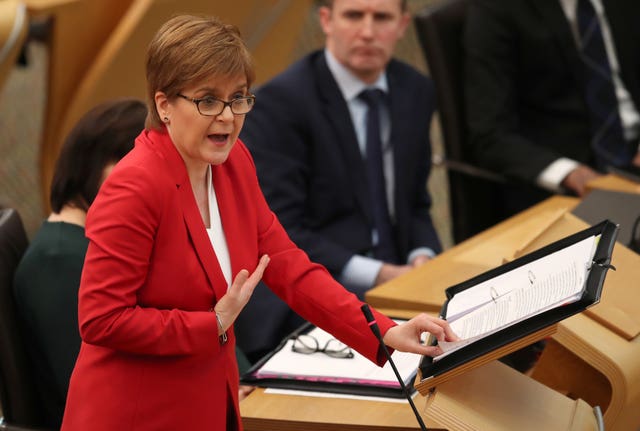
NHS chiefs are taking “all necessary steps” to deal with an infection at a maternity hospital which has been linked to the deaths of two premature babies, the Scottish First Minister has said.
Nicola Sturgeon sent her “heartfelt and sincere condolences” to the families of the two infants, who were being cared for at the Princess Royal Maternity Hospital in Glasgow when they contracted the Staphylococcus aureus infection.
Bosses at NHS Greater Glasgow and Clyde launched an investigation into the case on Thursday January 24, with Scottish Health Secretary Jeane Freeman informed on Monday January 28.
Ms Sturgeon said: “Our primary concern, and indeed that of the health board, is the safety and wellbeing of patients and their families at all times.

“The health board is taking all necessary steps to manage this incident and ensure patient safety.”
NHS Greater Glasgow and Clyde publicly confirmed the deaths on Wednesday, in a statement which said the infection was “one of a number of contributing causes” in the deaths of the youngsters.
Both infants were “extremely poorly” due to their very premature births, the health board said.
A third baby at the hospital has the same bug, but is not currently giving staff any cause for concern.
Dr Alan Mathers, chief of medicine, women’s and children’s services at NHS Greater Glasgow and Clyde, said on Thursday that the source of the infection may never be known.
An incident management team has been set up to investigate three cases of the Staphylococcus infection at the hospital’s neonatal unit.
Speaking at First Minister’s Questions in the Scottish Parliament on Thursday, Ms Sturgeon said she wants to put “on record my heartfelt and sincere condolences to the parents of the two babies who died”.
Scottish Conservative interim leader Jackson Carlaw – who is filling in for Ruth Davidson while she is on maternity leave – asked her about the case, saying: “Patients and families need to have confidence that when a case like this emerges, everything, everything, is done to minimise the spread of infection any further.”
Patients and families need to have confidence that when a case like the one at the Princess Royal Maternity Hospital emerges, everything is done to minimise the spread of infection any further.#FMQs pic.twitter.com/n2NNXdUrW6
— ScotConservatives (@ScotTories) January 31, 2019
He pressed Ms Sturgeon on when Scottish ministers had been made aware of the deaths, noting that the investigation began on January 24.
The First Minister told him: “The Health Secretary became aware of these infections, I understand, on Monday of this week, and at that point asked for assurances.”
Since then, she said Ms Freeman had been “in regular contact with the health board”.
Prosecutors are continuing to look at two deaths at Glasgow’s Queen Elizabeth University Hospital. A 10-year-old boy and a 73-year-old woman died after contracting the Cryptococcus infection, which is linked to pigeon droppings.
Ms Sturgeon said: “The important thing of course is all of us ensure that not just in Greater Glasgow health board, but all health boards, that proper infection control procedures are in place and the Health Secretary and her officials are taking all appropriate steps to ensure that is the case.”
Following the deaths of the two premature babies, she said the hospital had stepped up regular screening and had put enhanced cleaning schedules in place.
Experts at Health Protection Scotland have also been asked to investigate and report on what happened, the First Minister said.
She added: “Staphylococcus aureus is unfortunately not an uncommon infection in people in hospital, including neonatal babies, and indeed that infection can be found in around one in four people.
“So that makes it all the more important that hospitals have in place rigorous infection control procedures.”
Jason Leitch, national clinical director at NHS Scotland, said earlier on Thursday that there is “no better place in the western world” for premature babies to be cared for than in Scotland’s neonatal units.
He added: “These units are safe and if your baby is premature and requires intensive care, this is exactly the place you want your baby to be.”
Some infections in the NHS in Scotland have fallen by 93% in the last 10 years, he said.
Dr Mathers said it “may be that we don’t ever get to the root of the problem” and find the source of the infection.


Comments: Our rules
We want our comments to be a lively and valuable part of our community - a place where readers can debate and engage with the most important local issues. The ability to comment on our stories is a privilege, not a right, however, and that privilege may be withdrawn if it is abused or misused.
Please report any comments that break our rules.
Read the rules here